Physical Address
304 North Cardinal St.
Dorchester Center, MA 02124
Physical Address
304 North Cardinal St.
Dorchester Center, MA 02124

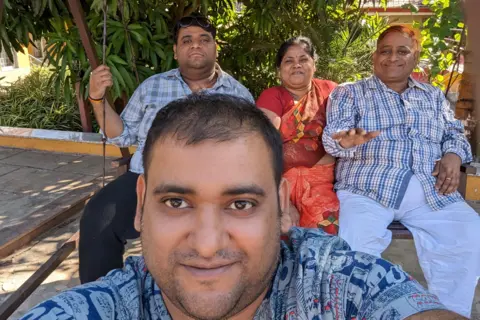 BBC
BBCOn the night of 9 December, a 34-year-old Indian man killed himself. Next to his body was a placard reading “justice is due”.
Atul Subhash left a detailed 24-page suicide note and an 81-minute video in which he blamed the trouble in his marriage and divorce proceedings.
The letter and the video, which contain distressing details about his life, have gone viral on social media and caused outrage.
The software engineer from the southern city of Bengaluru accused his estranged wife Nikita Singhania, her mother and brother of sustained harassment and torture – accusations they denied. The three were arrested a few days later and a court has remanded them for 14 days.
News of Subhash’s tragic death has also galvanised men’s rights activists and started a wider debate around India’s tough dowry law – which was designed to protect women from harassment and even murder.
But many argue that with cases of divorce steadily rising, the law is now being misused by women to harass their husbands, even forcing them to kill themselves. India’s top court has also weighed in, with one judge describing it as “legal terrorism” that was “intended to be used as a shield and not as an assassin’s weapon”.
Women’s activists, however, point out that demands for large dowry payments from husbands’ families still continues to kill thousands of women every year.
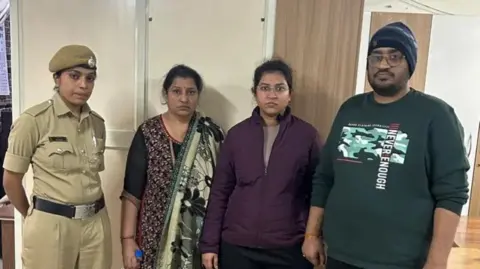 Bengaluru police
Bengaluru policeSubhash and Singhania married in 2019, but had been living apart for three years and Subhash said he was not allowed to meet their four-year-old son. His wife, he alleged, had filed “false court cases”, accusing him of cruelty, dowry harassment and various other wrongdoings.
In the video, he accused the Singhania family of “extortion” and said they had demanded 30m rupees ($352,675; £279,661) to withdraw the cases, 3m rupees for visitation rights to their son and asked to raise the monthly maintenance from 40,000 rupees to 200,000 rupees.
He then spoke about the dozens of long trips he made over the past few years to attend court hearings and accused a judge of harassment, seeking a bribe from him and mocking him. A notice which appears to have been issued by the judge refers to the allegations as “baseless, immoral and defamatory”.
News of the suicide prompted a firestorm of protests in several cities. Many took to social media to demand justice for Subhash.
They said his suicide should be treated as a case of murder and targetted Singhania, demanding she be arrested and sent to prison for life.
On X (formerly Twitter), thousands tagged the American multinational firm where she worked, demanding that they sack her.
Following the outrage, the police in Bengaluru opened an inquiry against those named in the suicide note. On 14 December, Singhania, her mother and brother were arrested on charges of “abetment to suicide”.
During interrogation, Singhania denied the allegation that she had been harassing Subhash for money, Times of India quoted the police as saying.
In the past, Singhania had also levelled grave charges against her husband. In her 2022 petition for divorce, she had accused him, his parents and brother of harassing her for dowry. She said they had been unhappy with the gifts her parents had given during the wedding and demanded an additional 1m rupees.
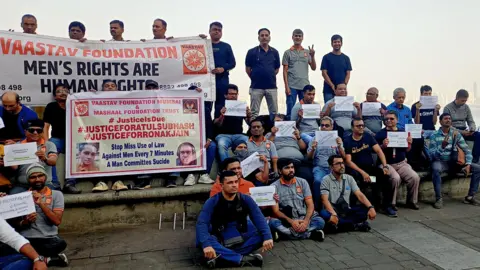
Dowries have been outlawed in India since 1961, but the bride’s family is still expected to gift cash, clothes and jewellery to the groom’s family. According to a recent study, 90% of Indian marriages involve them and payments between 1950 and 1999 amounted to a quarter of a trillion dollars.
And according to the National Crime Records Bureau, 35,493 brides were killed in India between 2017 and 2022 – an average of 20 women a day – over dowry demands, sometimes even years after the wedding. In 2022 alone, more than 6,450 brides were murdered over dowry – that’s an average of 18 women every day.
Singhania claimed that her father died from a heart attack soon after her wedding when Subhash’s parents went to him to demand the money. She also alleged that her husband used to threaten her and “beat me up after drinking alcohol and treated the husband-wife relationship like a beast” by demanding unnatural sex. Subhash had denied all the allegations.
Police say they are still investigating the allegations and counter-allegations but Subhash’s suicide has led to growing calls to rewrite – even scrap – India’s stringent anti-dowry law – Section 498A of the India Penal Code.
The law was introduced in 1983 after a spate of dowry deaths in Delhi and elsewhere in the country. There were daily reports of brides being burnt to death by their husbands and in-laws and the murders were often passed off as “kitchen accidents”. Angry protests by female MPs and activists forced parliament to bring in the law.
As lawyer Sukriti Chauhan says, “the law had come after a long and hard fight” and “allows women to seek justice in cases of cruelty in their matrimonial homes”.
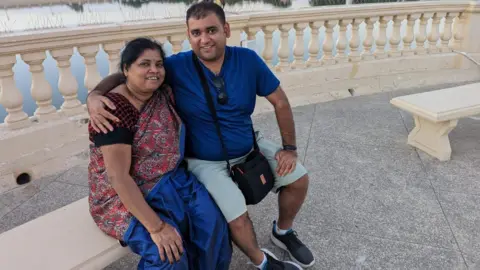
But over the years, the law has repeatedly made headlines, with men’s activists saying it is being misused by women to harass their husbands and their relatives.
India’s top court has also warned against the misuse of the law on many occasions. On the day Subhash’s suicide was reported, the Supreme Court once again flagged – in an unrelated case – “the growing tendency to misuse the provision as a tool for unleashing personal vendetta against the husband and his family”.
Amit Deshpande, founder of Mumbai-based men’s rights organisation Vaastav Foundation, says the law is being used “mostly to extort men” and that “there are thousands of others who are suffering like Subhash”.
Their helpline number, he says, receives about 86,000 calls every year and most cases are about matrimonial disputes that include false dowry cases and attempts at extortion.
“A cottage industry has been built around the law. In each case, 18-20 people are named as accused and they all have to hire lawyers and go to court to seek bail. There have been cases where a two-month-old baby or an ill nonagenarian was named in dowry harassment complaints.
“I know these are extreme examples but the whole system enables this in some manner. Police, judiciary and politicians are turning a blind eye to our concerns,” he says.
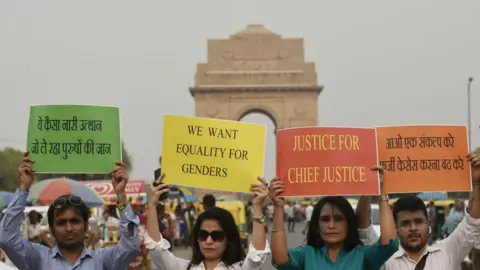 Getty Images
Getty ImagesMr Deshpande says according to the government crime data for more than 50 years, a large majority of male suicides were by married men – and family discord was the reason for one in four suicides among them.
Patriarchy, he says, also works against men. “Women have recourse to laws and they get sympathy, but people laugh at men who are harassed or beaten by their wives. If Subhash was a woman he could have had recourse to certain laws. So, let’s make laws gender neutral and extend the same justice to men so lives can be saved.”
There should also be stringent punishment for those who misuse the law, otherwise this will not be a deterrent, he adds.
Ms Chauhan agrees that women who misuse the law should be punished, but argues that any law can be misused. The Bengaluru case is in court and if it is proven that it’s a false case, then she should be punished, she says.
“But I do not support it becoming gender neutral. The demand for that is regressive as it disregards the need for special measures that acknowledge that women are disproportionately impacted by violence.”
Those going after Section 498A, she says, are “driven by patriarchy and because it’s a law for women, attempts are made to strike it down”.
“It came after years of societal patriarchal injustice. And this patriarchy remains the reality of our generation and will continue for generations to come.”
Despite the law, she says, demand for dowry is rampant and thousands of brides continue to be killed over it.
The need of the hour, she adds, is to “make the law stronger”.
“If three out of 10 cases that are filed are false, then it is for the courts to impose penalty on them. But women are still suffering very much in this country so do not ask to repeal the law.”
Follow BBC News India on Instagram, YouTube, Twitter and Facebook.
BBC Action Line
If you have been affected by any of the issues raised in this story a list of groups offering help and advice is available from the BBC Action Line